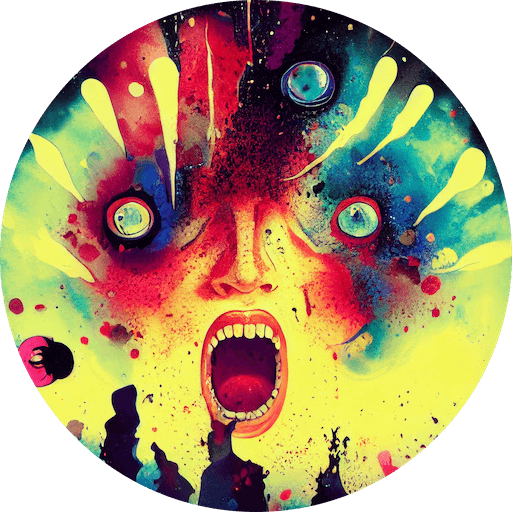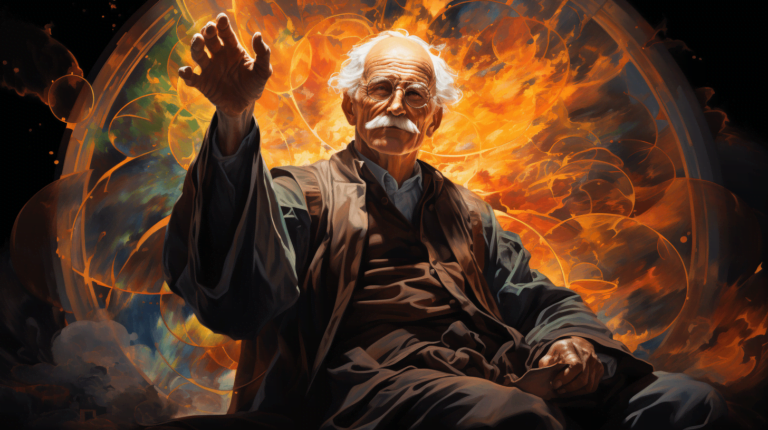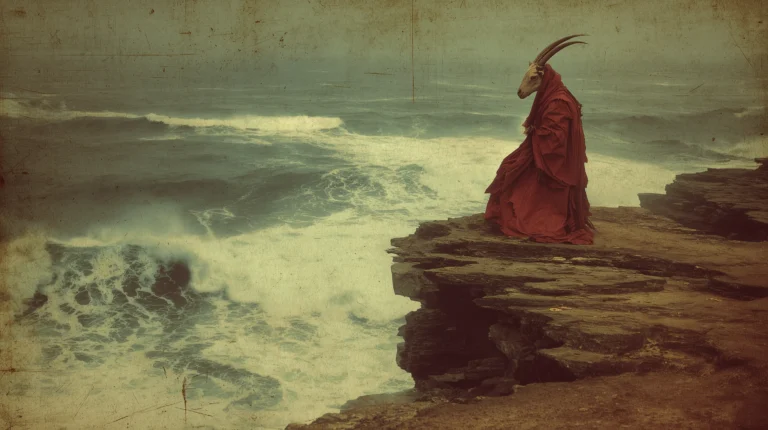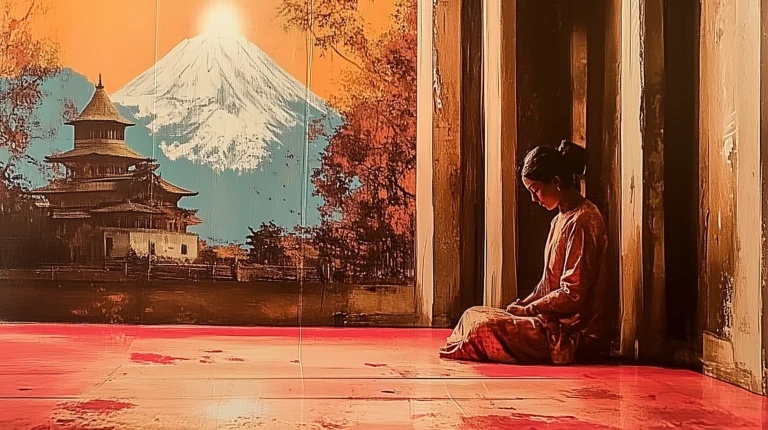Journey Toward Sublime: A Life Unfolding
This is not a march toward perfection. It’s a rising, past noise, past fear, past the whirlpools that drain your days. The horse is your emotion and drive; the rider is your awareness. We don’t shoot the horse or let it bolt. We learn its gait, take the reins, and ride it toward higher ground.
On this road, courage is small and daily. We choose one brave act, we enter the arena, and we create, while the world argues in circles. We honor boundaries without hardening our hearts. We trade drama for devotion, distraction for craft, and comfort for meaning. We breathe, we label the storm, and we move anyway.
Note: labeling doesn’t mean using your own thoughts to fight your own thoughts, as both are generated by memory. Labeling means, for example, saying I feel abandoned now and simply labeling it. Or I feel ignored now and just labeling it and being with the feeling. Be aware of the pain or the itch of that feeling. Do not run away or distract yourself.
The Sublime is not somewhere else. It’s what appears when you align your state, your choices, and your work, again and again, until awe becomes a habit. Step up to the threshold. Grip the reins. We ride whenever we can, today, tomorrow, always.
What “sublime” means
From Latin sublimis—“lifted up, lofty.” Likely from sub (“up to”) + limen (“lintel/threshold”). So: to rise above the ordinary; to stand at a higher threshold of being.
Sublime, defined for our journey
Sublime = a life where emotion is mastered (not muted), fear is transmuted into courage, craft is pursued with devotion, and you stay above the whirlpools of other people’s drama. You ride the horse; you don’t shoot it or let it bolt.
Atomology: the core atoms of a Sublime life
- North Star — a single sentence of direction.
- Composure — state control under stress (breath, posture, labeling).
- Courage — micro-bravery daily; rejection reps weekly.
- Craft — one skill you’re willing to suffer to improve.
- Claritas (Clarity) — say no to most; timebox the vital.
- Boundaries — compassion without getting pulled into whirlpools.
- Integrity — do what you said, especially when mood dips.
- Awe — regular contact with beauty/nature/art; enlarges the frame.
- Service — create value beyond yourself.
- Recovery — sleep, movement, solitude; keep the horse fed.
“Life of the Sublime” — a simple operating system
- Rider (you, the chooser): Rehearse your North Star each morning; decide today’s one courageous action.
- Horse (emotion/drive): Before hard things: 60 seconds box-breath → name the feeling → pick the smallest next move.
- Arena (work that matters): Daily 45–90 min block, phone out, work on craft. After: 2-minute AAR (win / snag / tweak).
- Stable (energy & boundaries): Sleep window, daily movement, inputs diet (less doom, more books), and a hard rule: Don’t enter other people’s emotional whirlpools.
Field rules (pocket version)
- “Small and soon beats big and later.”
- “Own your state first; act second.”
- “If it isn’t a clear yes, it’s a no.”
- “Fall forward: short fall → one true fact → one next step.”
- “Seek awe weekly.” (Sunrise, symphony, cathedral of trees—anything that makes you quietly bigger.)
Daily loop (10 minutes)
- 3 breaths; label the current feeling.
- Read your North Star.
- Choose one micro-brave act.
- Start five minutes now.
- Log: win / lesson / gratitude.
Weekly reset (20 minutes)
- Review: What moved the needle? What dragged me into whirlpools?
- Plan: one craft target, one boundary you’ll enforce, one awe moment to schedule.
- Ask: “What would this look like if it were easy, and still true?”
That’s Sublime in practice: elevated, steady, brave, and useful.
Twenty one blunt Sublime questions
- If life feels like a loop, what part of you keeps pressing repeat.
- Is your depression a message or an alibi.
- What does your anxiety protect that your courage would destroy.
- Do you choose or does your wiring choose and you clap.
- If genes tilt the table, what do you still place on it.
- Are you a customer or a consumed object.
- Is your pleasure nourishment or numbing.
- What would you do today if fear could not vote.
- If the universe is random, why are you so predictable.
- How much of your success is luck you refuse to admit.
- Is sex intimacy or performance.
- If robots love better manners than you, who is more human.
- If A.I knows your desires, are they still yours.
- Are you stupid or just lazy with your attention.
- Which bias owns you and pays no rent.
- Does porn teach you to touch or to vanish.
- Is discipline freedom or a new prison.
- If you never sit in silence, who is talking in your head.
- What truth would you tell if no tribe could cancel you.
- If no one watched, would you still live like this.
- When you die, will your life read as a choice or as drift.
Sublime in physics and chemistry: Solid goes straight to vapor without becoming liquid. Examples include dry ice and iodine. Heat lifts the particles free. Cooling lets them settle back as a clean solid deposit.
Sublime as a life principle: Heat is attention and adversity. Vapor is expanded awareness. Deposit is integrated wisdom. No melting in the mess. Transform cleanly. Return crystallized.
How to live it
- Apply honest heat. Sit. Breathe. Face what is.
- Let the self expand. Give the feeling space without fixing.
- Do not stew. No ruminating melt. Observe and allow.
- Condense insight. Write the one line you learned today.
- Act from the new form. One sincere step now.
- Repeat the cycle. Heat. Rise. Settle. Grow.
Sublime, heat me with truth.
Lift me above conditioning.
Rider and horse move as one.
No watcher, no watched.
One brave step appears.
When you drift off, you notice the drift.
Sit. Breathe. Step.
Set me down clearer in the Sublime.
Again and again.
The Sublime is not perfection but rising above fear, above noise, into clarity and courage. You are both rider and horse, awareness and emotion, moving as one. To live the Sublime is to walk without seeking arrival, to act without needing escape, and to breathe as if nothing is missing.
The Sublime is not beyond you. It is not a mountain to climb or a throne to reach. It is your breath when you are honest. It is your voice when you stop hiding. The Sublime is your authenticity revealed: raw, present, unrepeatable.
To live the Sublime is to speak your truth, even when your voice trembles. It is to step forward without armor, to create without apology, to feel without flinching. You do not chase the Sublime. You remember it. You embody it.
So speak. Act. Become. Not louder, but truer. Let the world hear what only you can say, in the quiet power of your own Sublime.
Sublime to innocence.
Sublime to zero.
Begin again in innocence.
I return to the first breath.
I let all masks fall.
Naked Sublime.
Naked I am.
Naked.
I choose truth over armor.
I choose presence over pose.
I choose the start that never ends.
Here I am.
Clear.
Sublime.
Alive.
The New North: Meaning after God, Markets, and Machines
This section is inspired by Emmy van Deurzen’s Psychotherapy and the Quest for Happiness, with new insights on Artificial Intelligence.
We live in a civilisation that has traded a vertical axis for a horizontal one. Where a culture once looked up to a transcendent anchor, it now looks sideways to peers, screens, and systems. The switch sounds rational. We have facts and models, data and dashboards, so why keep the sky for guidance.
Yet the exchange has consequences. When society replaces transcendence, the self becomes a project, success becomes a moral duty, and technology offers itself as priest and oracle. The result is not merely new tools, it is a new anthropology. What a human is, and what a human is for, are being rewritten in silent code.
This section traces that rewrite. It examines the move from sacred law to social metrics, the rise of short foresight and fashionable cynicism, the seductions of new prophets in lab coats and black t-shirts, the cultural spread of reductionism as implicit metaphysics, and the pressure this puts on identity, care, politics, and truth.
It then situates artificial intelligence inside this shift, not as an exotic force from the future, but as the clearest mirror of our current creed. The aim is critical yet fair. The argument closes with a practicable hope, the kind that does not need illusions to breathe.
I. From transcendence to social proof
When a culture loses an agreed story of why, the how becomes total. Technique expands into purpose. The individual learns early that worth is comparative. Children are socialised by metrics, first in school, then in feeds, later in the market.
We are taught to be optimised versions of ourselves, healthy and productive, attractive and continually improving. The moral vocabulary shifts accordingly. Vice becomes failure to optimise. Virtue becomes performance that others can verify.
This is not simply narcissism. It is structural. Without a vertical point of reference, recognition by others becomes the only currency that cannot be faked. Fame, status, and wealth are interpreted as visible evidence of good living.
The pressure is heavy and diffuse, which breeds resentment and fatigue. Modern people often feel both compelled to compete and suspicious of the race. This ambivalence fuels the very cynicism that keeps the system running, since irony masks despair and sells well.
II. The hidden metaphysics of reduction
A culture can abandon theology yet retain metaphysics by stealth. Reductionism, the habit of explaining wholes only by their parts, is a quiet creed of our time. It offers genuine gains in the physical sciences, then slides into a total narrative about persons.
Mind becomes brain, love becomes chemistry, morality becomes evolutionary strategy, meaning becomes adaptive illusion. None of this is entirely false. Much of it is helpful in context. But when a method of analysis becomes a worldview, it answers questions by dissolving them.
The question of what life is for is reinterpreted as a category mistake. The human hunger for significance is explained away rather than engaged.
This produces a peculiar mix of cleverness and confusion. People can reason with fluency about well-being while struggling to say why well-being should matter, beyond evolutionary inertia or private preference.
The result is a society that speaks incessantly about happiness while remaining unsure what it is. In such a climate, wealth, youth, and speed masquerade as proxies for a fulfilled life. When these disappoint, the disappointment can feel like a personal failure, not a structural emptiness, which deepens isolation.
III. New prophets, old promises
The retreat of shared transcendence leaves a market for guidance. Technology entrepreneurs and scientific communicators move into the symbolic space once occupied by spiritual authorities. The marketing is secular, the function is priestly. A new device promises longer life and easier minds.
A new platform promises community, expression, and reach. A new pill promises a steadier mood and a sharper edge. These offers are not scams by default, many help in real ways. The problem is misplacement. We ask instruments to deliver orientation. We ask solutions to replace meaning.
A further problem is the incentive model. The attention economy rewards content that triggers fast arousal. The advertising economy rewards engagement that can be measured. Platforms that mediate our social proof thus tilt us toward spectacle, outrage, and self-branding.
In such a world, even virtue becomes theatre, and the theatre has a house style. The performative moral self often burns hot and fizzles quickly. Wisdom, by contrast, tends to be slow, receptive, and modest. The culture gives it little oxygen.
IV. Algorithmic life
Artificial intelligence does not create these dynamics, it crystallises them. Consider a few pressure points.
Reward culture at scale
- Recommender systems learn what keeps us on the page. They are not concerned with truth, only with predicted engagement. Over time they train our nervous systems. This is operant conditioning with planetary reach. The metrics we chase are presented as mirrors of public value, yet they are artefacts of platform design. The self learns to move in ways that please the machine that predicts it.
Deepfakes and the corrosion of evidence
- When any image or voice can be fabricated with consumer tools, testimony loses default credibility. We are pushed back to trust in networks and institutions, or to nihilistic suspicion where nothing is believed unless it flatters a prior group identity. Both trends intensify tribal sorting. The very idea of a common world becomes harder to maintain.
Parasocial intimacy and synthetic companions
- Large language models, chatbots, and avatar services supply soothing attention on demand. The solace is real for many, which should be acknowledged with care. The risk is a subtle rearrangement of intimacy, where responsiveness without vulnerability becomes the preferred norm. Human relationships then feel messy, slow, and expensive. Loneliness deepens in a world rich with simulation.
Automation and the meaning of work
- As more cognitive tasks are offloaded to machines, the promise is liberation. The reality is mixed. If income remains tied to labour, the liberated person may simply be unemployed. If income is decoupled, the person faces an old question in a new key. What shall I do when I no longer need to do something for money. Work is not only a wage, it is a structure for time and a theatre for contribution. Removing the necessity reveals the emptiness of our non-work narratives.
AI therapy and moral outsourcing
- Digital mental health tools and AI counsellors lower access barriers. They can be genuinely helpful for psychoeducation and basic support. Yet therapy is also a moral art. It rests on a view of the person, the good, and the nature of flourishing. When these judgments are embedded in opaque systems, clients can be nudged toward normative choices without recognising the norms. In short, we risk outsourcing not only techniques of care but visions of the good.
Surveillance capitalism and predictive governance
- The fusion of data extraction with behavioural prediction creates a form of soft control. Choices are shaped in advance by architectures of possibility. This is not a conspiracy, it is a business model joined to bureaucratic convenience. The citizen becomes a user, the user becomes a dataset, the dataset becomes a managed risk. Freedom remains in name, yet the edges of life are padded and channelled.
V. The return of fashionably serious nihilism
When meaning is hard to secure, postures become attractive. Irony protects against disappointment. Transgression signals independence. Deconstruction offers mastery without commitment.
Many people will say they are agnostic and leave it there. Others adopt the badge of nihilism to avoid the embarrassment of hope. The stance is understandable. It is also a trap. What presents as lucidity often hides fear of responsibility, since any real meaning would obligate. To accept that something is good in itself is to be claimed by it.
The better alternative to denial is modest metaphysics. It does not demand a single creed or a static picture of the divine. It recognises that human beings are teleological in practice, even when they deny it in theory.
We move toward perceived goods. We can examine those goods, rank them, and argue about them in public. We can treat persons as more than bundles of drives without pretending to know the final furniture of the universe.
VI. Rehabilitating the long view
Short sightedness is not a moral defect alone, it is an environmental effect. When timelines shrink to the next quarter, the next election, or the next post, foresight feels like a luxury. Cultures can counter this by cultivating institutions that stretch attention across decades.
Examples include independent scientific bodies with long mandates, civic education that frames history as a living inheritance, and legal safeguards that make it costly to profit from damage that appears only later. None of these supply meaning directly, but they protect the conditions in which meaning can be pursued without constant panic.
The person can do something similar. Long work is not fashionable, yet it is the mother of depth. Mastery of a craft, loyalty to a relationship, service to a neighbourhood or practice community, these install a sense of direction that algorithms cannot provide. They are not spectacles, they are daily vows.
VII. The open canon
One does not need to return to a dogmatic religion to regain orientation. The archive of human wisdom remains open. Ancient myths, philosophical dialogues, the poetry of mortality, and the reports of saints and sceptics still speak, not as infallible authorities but as conversation partners that widen the frame.
Reading across traditions shows recurring intuitions. Creation is a gift rather than a possession. The self is a pilgrim rather than a consumer. Goodness is better understood as alignment than as conquest. Evil is often pride mixed with fear. Gratitude stabilises. Courage clarifies.
Comparative attention also resists the provincialism of the present. It reminds us that our reductionist tale is not the only rational story on offer. There are accounts of personhood that respect biology while refusing to collapse mind into matter.
There are political visions that value prosperity while refusing to measure value only by price. There are spiritual paths that honour silence without denying the body. Such plural sources can nourish a practical philosophy without requiring a single metaphysical verdict.
VIII. Education after optimisation
Education in an optimisation culture becomes training for performance. The task is to restore education as initiation into judgement. That means teaching young people how to ask final questions with care. What is a person for. What does a good life contain. What costs am I willing to accept for integrity.
It also means equipping them to read systems, since many of their choices will be shaped by code. Algorithmic literacy should sit alongside logic and rhetoric. Students ought to understand how models are trained, what a loss function is doing to them as users, and why metrics cannot see what they were not designed to measure.
Philosophy helps by naming category errors. It shows where a biological explanation is powerful and where it is beside the point. It trains the courage to say enough when a mechanism promises the world. It also teaches attention. In a life of interrupted focus, the ability to sustain a question until it yields is a rare gift.
IX. Politics without enchantment and without despair
When societies lack a shared telos, politics tends to oscillate between managerial pragmatism and apocalyptic theatre. The first administers problems without addressing roots. The second supplies borrowed transcendence in the form of permanent crisis.
Artificial intelligence destabilises both. It exposes managerial limits, since complexity outruns control, and it supercharges apocalyptic rhetoric, since every change can be framed as existential.
A more adult politics would accept finitude. It would keep the tragic sense that not all goods are compatible, then practise the art of ranking them in public, with justification that opponents can respect.
It would regulate data use as a matter of dignity, not only of consumer protection. It would invest in common goods that markets underprovide, such as mental health care, slow culture, and shared places where citizens can meet without paying to be advertised to.
It would treat the information sphere as a civic infrastructure, with duties of maintenance, transparency, and resilience.
X. The ethical shape of AI
If AI mirrors us, then the ethics we write into it will be the ethics we live by. There are several non-negotiables.
First, clarity about ends. Safe systems are not only systems that do not crash people or poison the water supply. Safe systems are those that do not silently redefine the good. Alignment must include values that are open to contestation and review, not fixed by a committee and forgotten.
Second, constraints on extraction. Consent should be real for data collection, and refusal should not mean practical exile from social life. People must be able to participate without surrendering the intimate details that make manipulation easy.
Third, auditability. Decisions that affect opportunities, health, liberty, or public discourse must be open to explanation. Black boxes that govern the margins of ordinary life produce quiet injustice. When models cannot be fully explained, the systems that deploy them should be tilled with human oversight that is accountable in law.
Fourth, cultural humility. Building models that train on the archive of human language means inheriting its genius and its injustice. The task is not to sanitise the archive but to curate it with care, then to design feedback processes that reduce harm without amputating history.
XI. What remains of the person
Against the weight of systems and the glamour of technology, it is tempting to retreat to radical individualism. That path is thin. The person is not a sovereign island, the person is a relational centre. We become ourselves through attention and answerability.
The most durable meanings are discovered by promising something to someone and living the promise through time. Marriage is one example, friendship another, intellectual honesty a third, service a fourth. These are not nostalgias, they are structures that hold human possibilities open.
A further insistence is needed. The human person is not exhausted by function. To treat a person as instrumental only is to collapse value into use. Much of our disquiet arises when lives are judged by visible outputs alone.
The quiet labour of care, the previous failures that protected someone else from harm, the fidelity that prevents a bad outcome we never see, these do not register on dashboards, yet they are the fabric of a decent world.
XII. A modest metaphysics of meaning
One can reject superstition without rejecting transcendence. A modest metaphysics begins with the data of experience. People have ineradicable intuitions of the good, the true, and the beautiful. They quarrel about them yet never stop invoking them. They respond to awe as if it revealed, not merely entertained.
They act as if love discloses reality rather than distorts it. These are clues. We need not convert them into a single doctrine in order to live by them. We can test them in practice. Does gratitude change perception in a reliable way. Does attention to conscience enlarge or shrink a life. Does saying yes to responsibility make the world more coherent. Repeatable answers are already a kind of knowledge.
This stance does not idolise subjectivity. It invites intersubjective testing, traditioned conversation, and a posture of correction. It honours science as a method for the physical and honours philosophy as a method for the meaningful. It regards art as a probe of reality rather than an ornament. It treats silence as a mode of knowing.
XIII. Hope without illusion
Hope is not optimism. Optimism expects things to get better. Hope stays loyal even when the future is unclear. The picture above may sound harsh, but it opens a door. When old anchors fall, fake ones lose power too. People become ready for deeper commitments.
Empty shows can turn into a hunger for real substance. Even our machines can help if we guide them. The tools that distract us can be set up for study, craft, and care. The models that learn our weaknesses can also support our strengths if we design the right rewards.
Trust returns through practice. You earn self-trust by keeping small promises each day, especially when no one is watching. Trust in others grows when we treat people as ends, not as products. Trust in society grows when institutions choose transparency over convenience and accept limits for the sake of the young and the not yet born. Trust in reality grows when we let silence correct us and let beauty move us.
The new north will not look like the old heaven. It will be humbler, more conversational, and more honest about tragedy. It will also be freer, because meaning that we argue for and live is stronger than meaning we only inherit.
The world after God, markets, and machines is not empty. It is a garden that still needs care. If we choose attention over noise, responsibility over watching, depth over spectacle, and friendship over performance, then even in a culture of metrics we can live measurable lives that are not ruled by measurement. The horizon is close and still open. Breathe. Take the next sincere step. The rest can meet us on the way.







